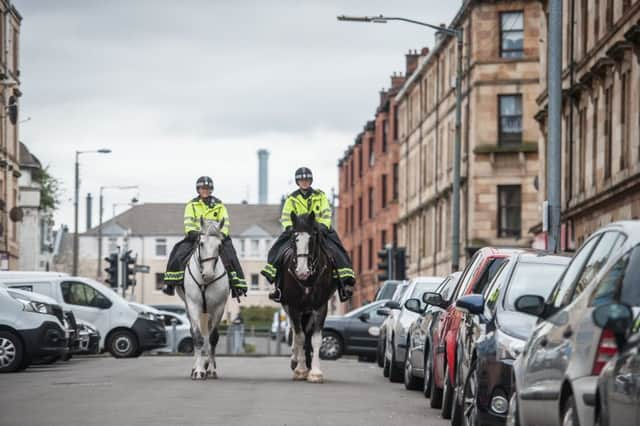Darren McGarvey: The defamation of Govanhill is lazy moral posturing


Having spent a great deal of my childhood in the area, playing around Govanhill Park with cousins, or visiting my mum, who lived on both Garturk and then Prince Edward Street, Govanhill has always felt like a second home.
In my early 20s, I took up residence in Govanhill myself for a few years. More recently, I worked there, running five-a-sides in the Neighbourhood Centre with local boys, leading reading clubs in Govanhill Library and facilitating playgroups with small children on Butterbiggins Road.
Advertisement
Hide AdAdvertisement
Hide AdUnlike many journalists and commentators who have written or opined about the area in recent days, amid allegations of child sex abuse, my opinion of Govanhill is informed.
This is a community in which almost a third of the population was born outside of the UK, where 42 languages are spoken, where life expectancy is 54 and 55 for men and women, respectively, and where crime, anti-social behaviour, violence, alcoholism, domestic abuse and addiction are considerably higher than the national average. To cut a long story short, Govanhill has fallen on hard times and this cannot be seriously disputed.
Where much of the friction in the community is found is in the tension between those who believe immigration is the proximate cause and those who point the finger at the broader economic issues of austerity and social inequality.
Social exclusion, expressed in myriad ways politically and culturally, lies at the heart of this deeply challenged community’s problems. Almost every social group in Govanhill suffers from some variant of exclusion, the effects of which are so severe that it’s begun to erode the basic social integrity of the community. For some, it’s exclusion from education, which often leads to a general disengagement from society, perhaps giving rise to scepticism or hostility towards public institutions, law enforcement and an apathetic political attitude. These people, by virtue of their exclusion, are not granted an insight into local decision-making and often adopt false beliefs and an adversarial posture towards anything that resembles authority.
For them, trendy terms like ‘regeneration’ or ‘steering group’ are by-words for opportunism and exploitation.
People who experience this sort of exclusion are less likely to engage with amenities in the area and are more likely to view those who do with scepticism. Every institution, charity or public-sector official is regarded as a proxy for ‘the man’ – the man who excluded them.
For others, social exclusion is arriving from rural Romania, with little academic education, trying to escape poverty for the benefit of your children, unable to read or speak English in a community which is already besieged by the challenges associated with poverty. For this group, exclusion is far more immediate and severe, compounded by a lack of political representation and hostility and suspicion from sections of a community already beset by its own challenges.
Govanill is a community where deprivation, and the psychosocial stress which underscores it, can emotionally disfigure already disadvantaged people; leaving them physiologically primed to develop chronic illnesses, mental health problems, alcoholism and addictions. It can also become an incubator for self-defeating attitudes, such as pathological distrust, or more perniciously, a spectrum of intolerance, along which racism and xenophobia become normalised as valid intellectual ideas. While these pernicious attitudes must be challenged and condemned, we must also pay sufficient attention to the social and economic wound from which they often erupt.
Advertisement
Hide AdAdvertisement
Hide AdIn this community, simple virtues like tolerance, patience and compassion can be emotional states outwith the grasp of people consumed by the consequences of poverty-induced stress on a human mind. Why do you think people here drink and smoke more?
Individuals and families, in a constant state of psychological fight or flight, can become unable to discern which aspects of their environments are supportive and which are threatening.
A crowd of young men on the street, loitering innocently, can seem intimidating and stressful. Not to say, in some cases, there isn’t a legitimate threat. But regardless of the truth, fear leads to gossip, myth-making and whispers which can give rise to new fears, anxieties and attitudes.
These attitudes interact with the physical environment to pervade a person’s sense of safety and well-being; toxifying their mental health, leaving them in a low, agitated mood through which everything else they see and hear is unconsciously filtered. Further compounding the strain and confusion are the very evident problems with which Govanhill has become unfairly associated: abysmal housing, fly-tipping, cockroach and rat infestations, poor lighting in back courts and stairwells, poor access to bin areas, and public services struggling to keep up. Sadly, when this community should be pulling together, united by the common cause of social inequality, Govanhill has, at times, turned on itself. This vulnerable community needs our support, patience and compassion, not lazy media tropes, ill-informed hot-takes, disingenuous, politically motivated outrage or moral posturing conducted from a safe, self-serving distance.
The fact immigration poses significant challenges in deprived communities and that migrants are welcome need not be mutually exclusive ideas. But this debate, in Govanhill and elsewhere, around immigration and the broader issue of social inequality requires a deeper understanding of how poverty and exclusion subtly shape social attitudes and behaviour. Skilful political mediation, taking into account such subtleties, is essential, not only for the people of Govanhill, but for Europe as a whole.